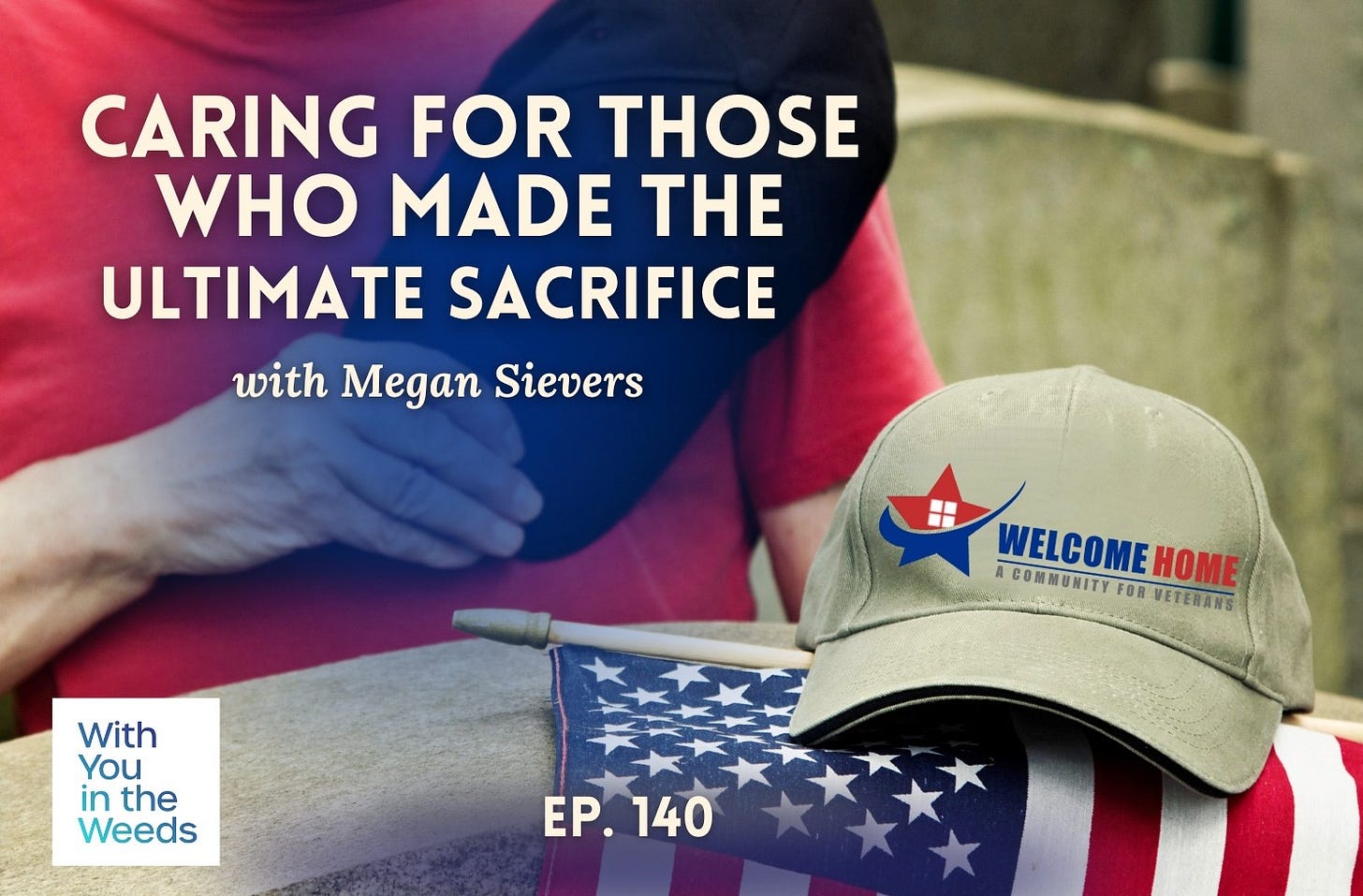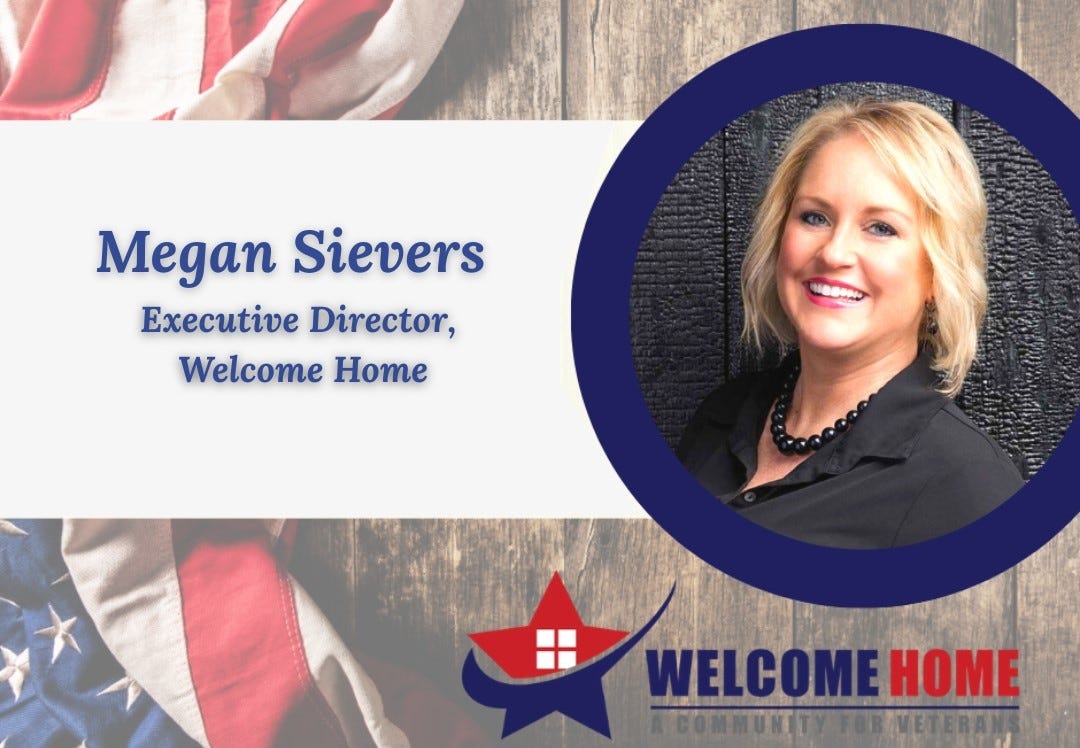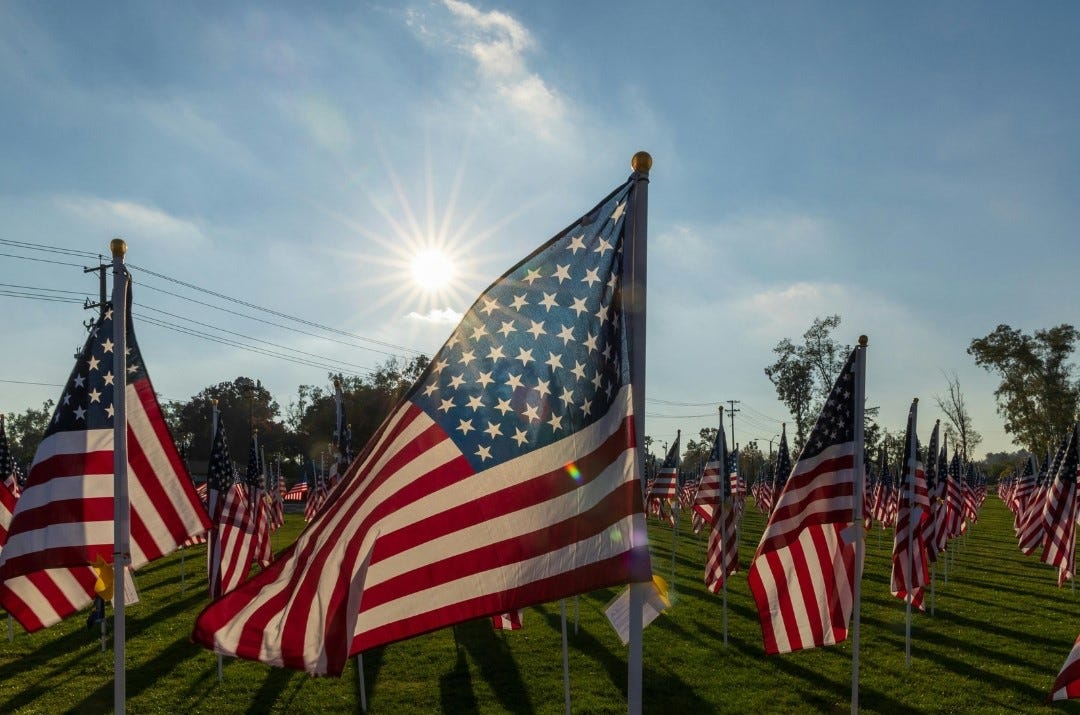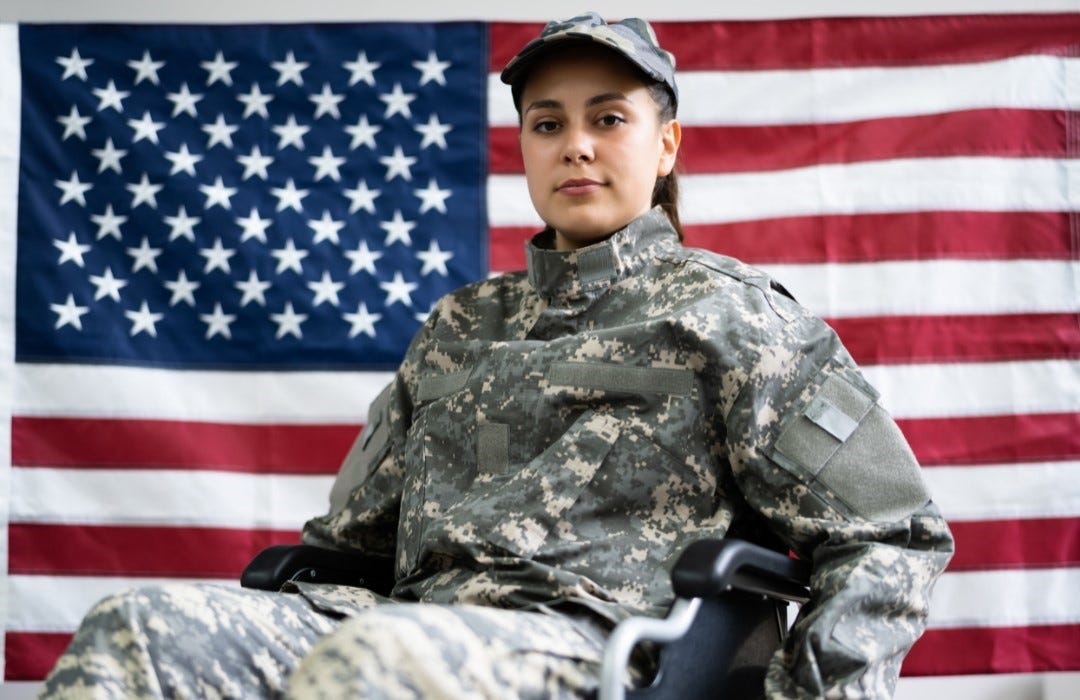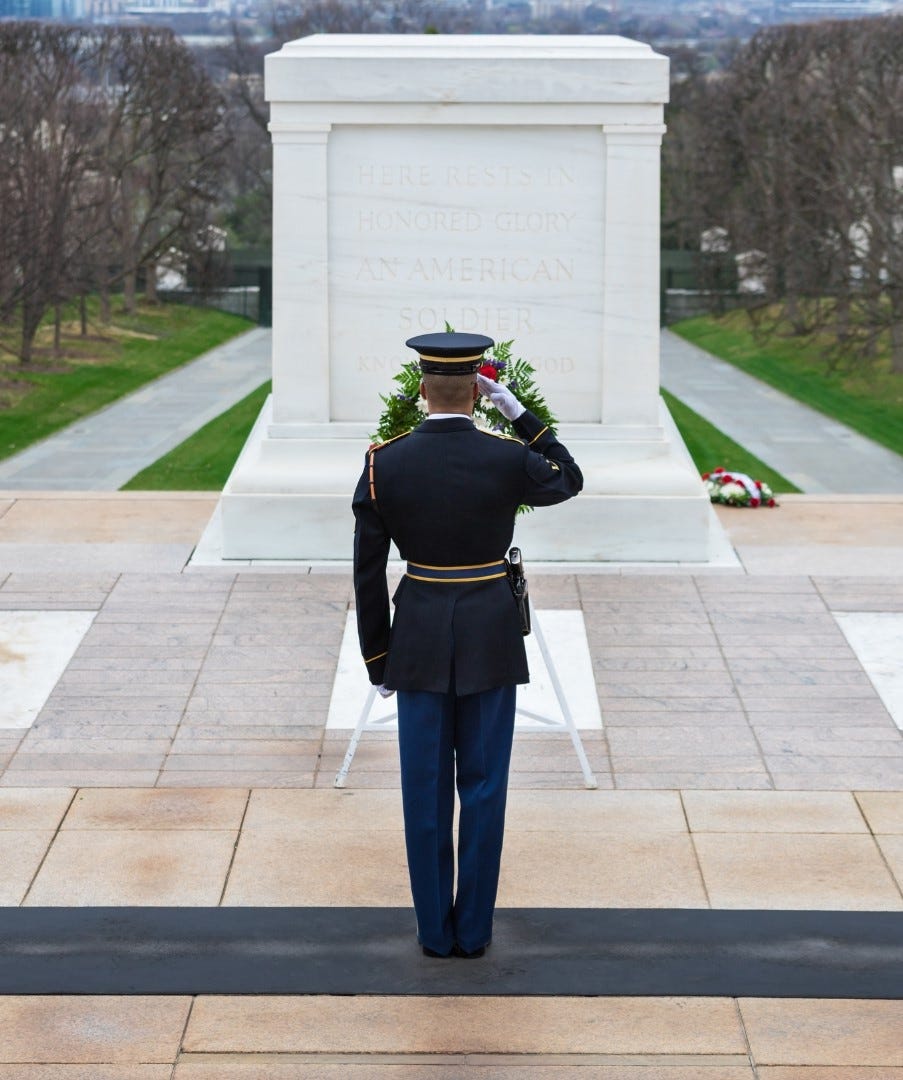Caring for Those Who Made the Ultimate Sacrifice
A debt that can never be repaid
How often do you think about the men and women who serve in the United States armed forces? While you may eagerly wave a flag at a parade, or wear a poppy on Veterans Day, you may not realize the extent of the sacrifices made by those who proudly serve our country – or the challenges they face when their service time ends.
In this episode of our ongoing series, Loving Your Neighbor as Yourself, Shay sits down with Megan Sievers, Executive Director of Welcome Home, a nonprofit in Columbia, MO, founded by Vietnam veterans to help fellow service members facing homelessness, unemployment, disconnection, and isolation.
Veterans face complex challenges—mental and physical health issues, substance abuse, and lack of support—and need community help to rebuild. Welcome Home provides shelter, support services, and housing assistance to veterans and their families, with a growing focus on preventing homelessness before it begins.
In this episode, you’ll hear:
The origins of Welcome Home as a ministry of veterans for veterans
How Megan was drawn to Welcome Home due to her own military family background
The complex barriers that veterans face when reintegrating into society
Types of support offered by Welcome Home and their community partners
As you listen, you’ll be reminded that supporting veterans is a way to honor their sacrifice and live out the call to love your neighbor as yourself. And you’ll learn about the work that Welcome Home is doing to honor veterans and restore lives.
Highlights of Shay’s Conversation with Megan
Shay: I'm glad to have Megan Sievers here with us today to talk a little bit about Welcome Home and what it does to help veterans in our community. Megan, tell us a little bit about Welcome Home – how it came about and what kind of work you do.
Megan: The mission and purpose of our organization is founded on the idea of caring for your neighbor over and above yourself. More than 30 years ago, a group of Vietnam veterans decided they could no longer accept seeing their brothers in arms dying on the street.
Many veterans came home from Vietnam and while they didn’t die in war, they died in their own community because of homelessness. So Welcome Home’s mission was to honor these veterans by helping them restore their lives. We have programs and services for veterans, and we do everything we possibly can to help them, but it takes a community to make achieving this goal possible.
Shay: Can you tell me more about the early days of the organization?
Megan: I've made it a mission of mine to archive our history as much as possible and I have a beautiful relationship with one of our founders, RC Higgins. He’s told me about how they started in the 1980s by trying to put resources together to help their veteran friends. It wasn’t until 1992 that a shelter was actually purchased.
The purpose at the time was to provide veterans with a place to live, but also to give them a phone number and physical address because without those, they couldn’t get their benefits. And benefits are so important. Benefits provide an income and health care. They can get you back on your feet.
Even in the 90s, the services that were provided were very basic. We’ve come leaps and bounds when it comes to helping veterans – both our organization and the government. We have come together as a nation to say we can do better; we can do more. I think it started with grassroots movements to treat our Vietnam veterans better.
Shay: I’m curious, what motivated you to work for an organization like this?
Megan: That’s a really good question. I think over time, my ‘why’ has probably changed. Seasons of life bring perspective and may change the reasons that you’re making decisions or choosing a certain path. For me, it started by going into military life with my husband when he served active-duty Air Force. Being a military spouse lets you see what all the families go through.
My uncle was killed in action in Vietnam. That's a very deep, powerful story in my family's history. Besides my husband, I have other friends and family who have served. When we had the opportunity to get out of service and come back home and I learned about Welcome Home, I had this epiphany: this is what I'm supposed to do. I’ve been executive director for four years now.
Shay: That’s awesome. Can you tell me the services that Welcome Home provides for homeless veterans?
Megan: We provide emergency and transitional shelter for those that are unhoused. We can serve veterans and their families, so if someone presents with children or a significant other, we can provide them with private housing for a temporary stay with wraparound supportive services: case management to put together housing plans and budgets, food security, anything they need to get on a path to a greater quality of life.
But in addition to that, over the last three or four years, we’ve started to focus on prevention. How do we not just get veterans off the street and keep them off, but how do we prevent it from happening in the first place? We work on ways to keep veterans housed, like helping them find affordable housing, offering temporary financial assistance, and providing mediation with landlords and property managers.
We also help with paperwork, transportation, and employment assistance. Whatever it is these veterans need, if we can't provide it in-house, we have resources and friends and partners in this community that we will connect them with.
Shay: When I used to think of veterans, I used to think only of veterans from Vietnam. But we've had wars in Iraq and Afghanistan, and so you see younger people now. What are some of the challenges that veterans face when they've served in the military and are trying to reintegrate into civilian life?
Megan: That's a great question and the answer is very complex. They are usually facing a multi-layered, multi-faceted set of barriers. When we see veterans that come through Welcome Home, they can be dealing with a plethora of things, like a mental or physical disability, or sometimes both. They may have PTSD (post-traumatic stress disorder) or TBI (traumatic brain injury). We also see substance use as an unhealthy coping mechanism.
When you’re talking about the barriers in life that veterans are facing, the mental and physical health issues, disabilities, substance abuse, lack of societal or familial networks – they can feel very alone. Isolated. It’s easy for them to get into the wrong crowd, and unless they have help and support from the community, they can’t get out.
If you walk into Welcome Home's door, you would not know the difference between one of our homeless veterans staying in our shelter and one of our staff people. These are not men and women that are not taking care of themselves, no pride, no joy, no sense of self. These are people that want to do better, they just don't know where to turn.
Shay: Is there are story you can tell of someone whose life has been changed by Welcome Home?
Megan: Absolutely. This just happened recently at a breakfast that they host for all military veterans and active duty at Truman Bar and Grill once a month. I was going and speaking with the group and a veteran that we had served years ago walked up to me.
He walked up and said, "Can I hug you?" And I was like, "Well, absolutely. I'm a hugger." So I gave him a big hug, and I said, "Why do you look so familiar?" And he said, "Well, because we met a time or two." And he went on to remind me that not only did we help him in our first shelter, but then he fell on hard times again after COVID.
Right around 2020 he moved back to the shelter. And he said he was really messed up, he really struggled, could not find housing, could not get his mind right. It was not until he moved into Welcome Home and started working with our case managers who he called “miracle workers” that he ultimately found his apartment. He said he's been living his best life. He’s working and he’s happy, you could just see it in his eyes.
Shay: It’s the least we can do to give back to them in any way we can.
Megan: Sometimes we forget how these people have served us. We have benefited from their service in the military, and we enjoy a lot of the freedoms we have because of that.
We can take for granted the sacrifices that they make and the hardships they face. Serving in the military may mean making the ultimate sacrifice – they give their lives. It’s important to remember that Jesus said there is no greater love than someone who gives his life for someone else.
Serving in the military may mean making the ultimate sacrifice – they give their lives. It’s important to remember that Jesus said there is no greater love than someone who gives his life for someone else.
Shay: That’s absolutely right, thank you for that reminder. You have some events coming up, is that correct?
Megan: Yes, we have our charity picnic coming up - our Annual Rock Bridge Lions Club Charity Picnic on September 15, 2025. Because it’s our 10th annual picnic, it's about going back and celebrating what we have accomplished so far.
On November 7th, we have our Annual Welcome Home Casino Night at The Crossing. This is our oldest and largest fundraising event. We will have friends from all over the country fly in for this event.
We’ll have tickets available soon for both events. We would love for anyone and everyone to join us as guests or provide sponsorships. If you have a business, you can donate gift certificate or gift baskets for auction at either event. And we need volunteers for both events, so there's lots of different ways to get involved.
Shay: Please check those out if you are in the Columbia, MO area! We love the mission of Welcome Home – eliminating veteran homelessness in our community. We do not want one veteran to be homeless, and you are fulfilling that mission in a great way. I think God has raised you up for this purpose and it’s been privilege to talk to you, Megan. Thanks for being on With You in the Weeds!
Recommended Resources
Welcome Home - Join the battle to end veteran homelessness
Rock Bridge Lions Club Annual Charity Picnic - September 15, 2025
10th Annual Welcome Home Casino Night - November 7th, 2025


